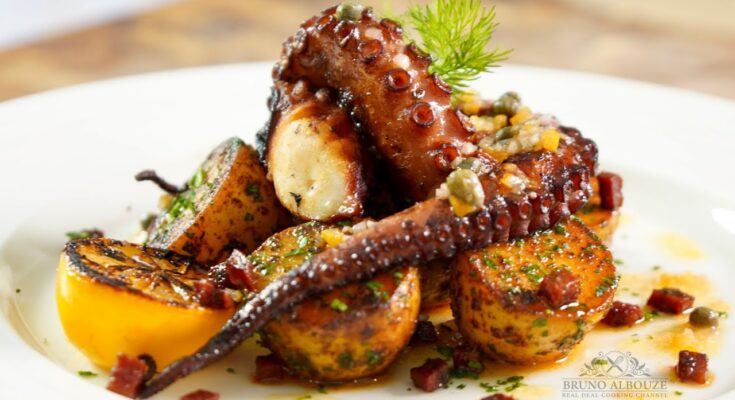Grilled Octopus Recipe: If you’ve ever visited a coastal Mediterranean town, you’ve probably seen octopus drying in the sun, ready to be grilled and served with a splash of olive oil and lemon. Grilled octopus is not just a dish; it’s an experience—a mix of smoky flavors, tender textures, and rich aromas that make it unforgettable. This recipe has become popular worldwide because it transforms a simple seafood ingredient into a restaurant-quality dish you can enjoy at home.
What makes grilled octopus stand out is its unique flavor profile. It combines the sweetness of the sea with the charred, smoky notes of the grill. When cooked right, the octopus turns out incredibly tender, with crispy edges that add an exciting texture to every bite. Plus, it’s naturally high in protein, low in fat, and packed with essential nutrients like iron, vitamin B12, and omega-3 fatty acids. That makes it not only delicious but also a healthy option for seafood lovers.
The beauty of grilled octopus is in its versatility. You can serve it as a starter with lemon and herbs, turn it into a main dish with sides like grilled potatoes, or even toss it in a refreshing salad. In this guide, we’ll break down everything—from choosing the right octopus to preparing, marinating, grilling, and serving it like a pro.
Ingredients You’ll Need
When it comes to cooking octopus, simplicity is key. A handful of fresh, high-quality ingredients can transform this seafood delicacy into something extraordinary. Let’s go over the essentials and some optional add-ons that can elevate the flavor.
Fresh vs Frozen Octopus – Which One to Choose
Surprisingly, many chefs recommend using frozen octopus instead of fresh. Why? Freezing helps break down the tough muscle fibers, naturally tenderizing the meat. That means less effort for you when it comes to prepping. If you have access to fresh octopus, that’s great too, but make sure it’s properly cleaned before cooking.
Essential Ingredients for the Recipe
Here’s what you’ll need:
- 1 whole octopus (about 2–3 pounds)
- 1 medium onion (quartered)
- 3–4 garlic cloves
- 2 bay leaves
- 1 teaspoon black peppercorns
- 1 teaspoon sea salt
- ½ cup olive oil (extra virgin for best flavor)
- 1–2 lemons (for juice and zest)
- Fresh parsley (for garnish)
Optional Flavor Enhancers
If you want to take your grilled octopus to the next level, consider adding:
- A splash of white wine to the boiling liquid
- Smoked paprika or chili flakes for heat
- Oregano, thyme, or rosemary for an herbal touch
- A drizzle of balsamic glaze when serving
These small additions can give your dish a unique personality while still keeping it true to the Mediterranean tradition.
Preparing the Octopus Before Grilling
Cooking octopus is all about preparation. Without it, you risk ending up with rubbery, chewy meat that nobody enjoys. Follow these steps to get your octopus ready for the grill.
How to Clean and Tenderize Octopus
If your octopus hasn’t been cleaned, you’ll need to remove the beak (mouthpiece), eyes, and internal organs. Many fishmongers will do this for you, so don’t hesitate to ask. After cleaning, rinse it thoroughly under cold water.
Tenderizing is the next key step. Traditionally, fishermen would pound the octopus against rocks to soften it. Luckily, you don’t need to go that far. Freezing it overnight or giving it a long, slow boil can achieve the same result.
Boiling vs Braising – Which Method Works Best
Before grilling, octopus should be pre-cooked to ensure tenderness.
- Boiling: Place the octopus in a large pot with water, onion, garlic, bay leaves, and peppercorns. Simmer for 45–60 minutes until tender.
- Braising: For extra flavor, you can braise the octopus in a mix of water, white wine, and herbs. This method infuses it with a subtle richness.
To check if it’s done, pierce the thickest part of a tentacle with a fork—it should slide in easily without resistance.
Marinating for Maximum Flavor
Once tender, let the octopus cool slightly, then cut it into manageable pieces. Prepare a marinade using olive oil, lemon juice, garlic, and herbs. Coat the octopus generously and let it rest for at least 30 minutes, ideally overnight in the fridge. The marinade not only boosts flavor but also helps create that golden, crispy char on the grill.
Step-by-Step Guide to Grilling Octopus
Now that the prep work is done, it’s time for the fun part—grilling! This is where the octopus takes on its smoky, charred flavor and becomes irresistibly delicious.
Step 1 – Preparing the Grill
Preheat your grill to medium-high heat. If you’re using charcoal, wait until the coals are glowing and covered with white ash. For gas grills, heat for at least 10–15 minutes before cooking. Brush the grates with a little oil to prevent sticking.
Step 2 – Seasoning and Oiling the Octopus
Remove the octopus pieces from the marinade and shake off excess liquid. Lightly drizzle with olive oil and sprinkle with a pinch of sea salt and smoked paprika if you like.
Step 3 – Grilling the Octopus to Perfection
Place the tentacles directly on the grill. Cook for 3–4 minutes per side until you see crispy edges and grill marks. Be careful not to overcook—octopus can dry out quickly. You’re looking for a slightly charred outside with a juicy, tender inside.
Step 4 – Resting and Serving the Dish
Once grilled, transfer the octopus to a serving plate. Let it rest for a few minutes to lock in juices. Drizzle with more olive oil, squeeze fresh lemon juice on top, and garnish with chopped parsley. Serve warm with your choice of sides.
Best Side Dishes to Serve with Grilled Octopus
A perfectly grilled octopus deserves equally delicious sides to complete the meal. Since the dish is Mediterranean in origin, it pairs beautifully with fresh, vibrant accompaniments.
Mediterranean Salads and Fresh Vegetables
A Greek salad with tomatoes, cucumbers, olives, and feta cheese is a refreshing choice. You can also serve it with grilled vegetables like zucchini, eggplant, or bell peppers for a colorful plate.
Grilled Potatoes and Bread Options
Crispy roasted potatoes or garlicky mashed potatoes are a hearty complement. Freshly baked bread or pita is perfect for soaking up the olive oil and lemon juice from the octopus.
Wine and Drink Pairings
For drinks, a chilled glass of white wine like Sauvignon Blanc or Assyrtiko pairs beautifully. If you prefer red, go for a light option like Pinot Noir. For non-alcoholic choices, sparkling water with lemon works well.
Tips and Tricks for the Perfect Grilled Octopus
Grilling octopus can seem intimidating at first, but with the right techniques, you’ll get a dish that’s tender, flavorful, and downright irresistible. The secret lies in mastering the balance between pre-cooking and grilling. Too little boiling and your octopus will be rubbery; too much grilling and it’ll dry out. Here’s how to avoid the pitfalls and get it just right every time.
Avoiding Common Mistakes
One of the biggest mistakes beginners make is throwing raw octopus straight on the grill. This almost always results in tough, chewy meat that’s unpleasant to eat. Remember, octopus needs pre-cooking—whether by boiling, braising, or pressure cooking—before it ever hits the grill.
Another mistake is over-marinating with acidic ingredients like lemon juice or vinegar. While a splash of acidity adds flavor, leaving the octopus in too much acid for too long can actually toughen the meat instead of tenderizing it. Stick to olive oil, herbs, and just a hint of citrus in your marinade.
Finally, don’t cut the octopus into tiny pieces before grilling. Larger chunks or whole tentacles grill better, keeping the inside moist while the outside crisps up.
How to Get the Right Char Without Drying It Out
The beauty of grilled octopus is in that irresistible smoky char. To achieve it, preheat your grill properly and oil the grates before cooking. You want the octopus to sizzle the second it hits the grill.
Cook the tentacles over direct medium-high heat for just a few minutes per side. You’re not cooking it through at this stage—that’s already been handled during boiling—you’re just searing the outside. Brush lightly with olive oil while grilling to keep it from drying out and to enhance that glossy, golden finish.
Pro tip: If you’re using charcoal, try adding a small piece of wood (like oak or olive wood) for an extra smoky flavor that complements the seafood beautifully.
Storing and Reheating Leftovers
If you’re lucky enough to have leftovers, store them properly to preserve flavor and texture. Place grilled octopus in an airtight container and refrigerate for up to 3 days. To reheat, avoid microwaving—it makes the texture rubbery. Instead, warm it in a skillet with a splash of olive oil, or give it a quick turn on a hot grill for 1–2 minutes.
For longer storage, cooked octopus freezes surprisingly well. Just wrap it tightly in plastic wrap, then place it in a freezer bag. Thaw in the fridge overnight before reheating.
Variations of Grilled Octopus Recipes
One of the best things about octopus is its versatility. While the Mediterranean version with olive oil and lemon is a classic, there are countless ways to adapt the recipe based on different cuisines and flavor preferences.
Greek-Style Grilled Octopus
In Greece, octopus is a beloved dish, often enjoyed with a simple drizzle of olive oil and fresh lemon. A popular variation is to add oregano and serve it alongside fava beans or lentil salad. Sometimes, it’s even grilled with a splash of ouzo (Greek anise-flavored liquor), which gives it a distinct aromatic note.
Spanish Pulpo a la Gallega Variation
In Spain, octopus is a staple of Galician cuisine. Instead of grilling, the tentacles are often boiled, then lightly grilled or seared before being sliced into bite-sized rounds. They’re traditionally sprinkled with smoked paprika, coarse sea salt, and a drizzle of olive oil, then served on a wooden plate with boiled potatoes. This rustic style has become famous worldwide.
Asian-Inspired Grilled Octopus
For a more adventurous twist, try an Asian-inspired marinade. Combine soy sauce, sesame oil, ginger, garlic, and a touch of chili paste, then grill the octopus as usual. Garnish with toasted sesame seeds and scallions for a bold, umami-rich dish that pairs beautifully with steamed rice or stir-fried vegetables.
This fusion style is perfect if you want to break away from traditional flavors and surprise your guests with something unique.
FAQs about Grilled Octopus Recipe
1. How do I know when octopus is tender enough before grilling?
You should be able to pierce the thickest part of the tentacle easily with a fork. If it slides in without resistance, your octopus is ready for the grill.
2. Can I grill octopus without boiling it first?
It’s not recommended. Raw octopus tends to be very tough, and grilling alone won’t tenderize it properly. Pre-cooking is essential for the best results.
3. What’s the best type of grill for octopus—charcoal or gas?
Both work well, but charcoal adds a smoky depth of flavor that complements seafood beautifully. Gas grills, however, are more convenient and easier to control.
4. How can I prevent octopus from sticking to the grill?
Make sure your grill is hot and properly oiled before placing the octopus on it. You can also brush the octopus itself with olive oil to reduce sticking.
5. Is grilled octopus healthy?
Yes! Octopus is a lean source of protein, rich in vitamins and minerals like B12, iron, and selenium. When grilled with olive oil and lemon, it makes for a nutritious and heart-healthy dish.
Conclusion
Whether you stick to the classic Mediterranean version with lemon and olive oil, or experiment with Spanish or Asian-inspired twists, grilled octopus is guaranteed to wow your family and guests. Pair it with fresh salads, grilled potatoes, or a glass of crisp white wine, and you’ve got yourself a meal that’s nothing short of unforgettable.
So the next time you’re planning a special dinner or just want to bring a taste of the coast to your table, give this grilled octopus recipe a try—you might just discover your new favorite seafood dish.



